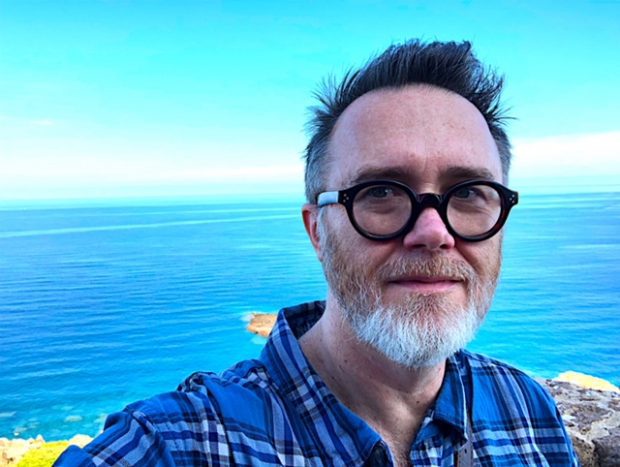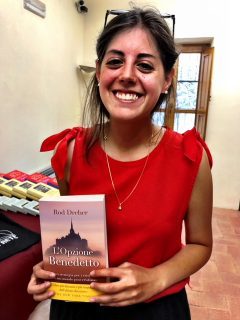Sardinia Diary

Hello from Rome, where I am momentarily alighting in my hotel room before setting off for a Benedict Option speech at the Teatro Eliseo this evening. Things went reasonably well in Castelsardo, in Sardinia; the only problem was the weight of anxiety hanging over me as my hosts and I worked hard to find the bag that the airlines lost in transit. It contained all of my clothes, except the ones I was wearing. It is no fun to have to wear the same clothes for three days in Italian late summer.
At last the bag arrived this morning on a flight from Milan. It was a close call: I took at 2pm flight from Sardinia to Rome, picking up the lost bag in the Alghero (Sardinia) airport on the way. I had to open my bag for the customs officials. The suit, the dress shirts, the jacket, the pants – they all looked so clean, wrinkle-free, and unsweated-upon. I had to rush to check the just-found bag in for the Rome flight. Happily, it arrived safely with me, and here we are, in a hotel just outside the Vatican walls.
In Castelsardo, I gave a talk as part of a six-week long ideas festival. My hosts and interlocutors included Italian journalists and philosophers. My interpreter was the tireless Francesca Guerra, a student of English and Russian literature. More on her in a moment.

On my first night in town, the group had dinner al fresco at a long table set up in one of the streets of the medieval village. Castelsardo was built in the medieval period on the side of a steep hill. The historic center is a warren of narrow stone streets, passageways, and terraces linked by stairs. It truly feels like another world.

That first night, over pasta, salami, pecorino cheese, and good red Sardinian wine, we talked at length about the crisis in the Catholic Church. Everyone at my table was a practicing Catholic. Some support Archbishop Vigano’s testimony; others have problems with it.
I heard that night, and in subsequent conversations in my time there, that Vigano made a serious error (from the point of view of the Italian public) in demanding that Pope Francis resign. That was going too far for most Italians, it appears. I asked if Vigano has much support from the Italian public, and several people answered no, he doesn’t (this, even if they personally support him).
Additionally, I had the strong impression that some (most?) Catholics here don’t have the same sense of crisis over clerical sex abuse that we Americans do. About children, yes, maybe. But about priests having sex lives with other adults (men and women)? There is a world-weary sense that the Church has always been corrupt, so what can you do? Et cetera. I’m not saying everyone I talked to shares that point of view, but I am saying that in general, it’s easy to convince yourself, if you live here, that the crisis in America is not as big a deal as it actually is.
This may be important in trying to gauge why Pope Francis is failing to respond to the alarms going off in the United States. It is hard to believe that he still refuses to speak about the crisis directly, including to dispute the Vigano allegations. It beggars belief that there is a legitimate reason why he has not answered the request that Cardinal Daniel DiNardo, head of the US Catholic bishops’ conference, made in July to meet face-to-face with him to discuss the McCarrick situation. Maybe there is a good explanation for this, but with each passing day, it appears that Pope Francis is desperate to avoid accountability. It looks as if he has something to hide.
Yesterday the Complicit Clergy reformist website published this 12-minute video exploration of a horrible abuse situation involving priests who cared for handicapped children – kids who could not speak or talk, and therefore could not tell anyone what was happening to them. Watch:
[youtube https://www.youtube.com/watch?v=zEvEoIloCDY&w=525&h=300]
This clip features a hidden-camera interview with one of the abusers, a priest who is old now, and living in a nursing home. In the clip, he admits to all of the abuse, and even laughs about it. It’s one of the most demonic things you’ll ever see. Some of this abuse happened in Buenos Aires, when Francis was the local archbishop. Argentine victims allege that they asked for a meeting with Archbishop Bergoglio, but he blew them off. There’s more to it, including a confrontation with him as pope.
Francis is setting a tone of defiant nonchalance – and one of his closest American collaborators, Cardinal Blase Cupich of Chicago, is following the script. In a tense meeting with Chicago seminarians, Cupich blew off the clerical abuse scandal. Sure, he said, it bothers him too, but the Church has more important things to do than to worry about the sexual integrity of its clergy. Like immigration.
Anything Cardinal Cupich or any other prelate wants to accomplish will not happen if their credibility has been destroyed. Nobody wants to listen to an archbishop lecture people on how to treat immigrants when he has shown himself to be effectively indifferent about the sexual behavior of the Church’s priests. Last week I was speaking to a medical ethicist who told me that a planned 2002 campaign to deploy the Catholic Church’s moral authority to fight embryonic stem cell research imploded before launch amid that year’s abuse scandal.
Anyway, in multiple conversations since I arrived in Italy, I’ve talked with Catholics about what the laity should expect from the Church. We agreed that the Christian faith has to be more than mere moralism – that is, moral behavior as the ultimate goal. But if there is no strong moral content to the faith, then it becomes nothing but sentimentality – Moralistic Therapeutic Deism, in fact. Kierkegaard talked about this kind of thing back in his day. The Ethical stage of existence is superior to the Aesthetic stage, because at least it requires living by higher standards than service of the Self and its desires, but it is still not fully human. Only by entering into the Religious stage – which combines the Aesthetic and the Ethical and transcends them both – does the individual begin to realize his true identity, and to live fully.
That’s more than most of us care to get into here, in a blog post, but I do want to make clear that morality is necessary but not sufficient to the authentically Christian life. If we Christians live by a morality that is no different from that of the world, then how can we transform the world? I recall a passage from the liberal Episcopal priest Chloe Breyer’s memoir of her first year in seminary. She talked about how she was doing prison ministry, and was struggling to get the inmates to understand why there was no real black-or-white in a Bible story. A Muslim inmate at the back mocked her, saying to the other inmates that this is why they should become Muslim: because Allah’s words are clear. In fact, Breyer’s interpretation of Christian Scripture was a standard liberal relativist’s reading, and not what a more orthodox Christian would have said – this, even though an orthodox Christian should have no trouble admitting that ambiguity exists in many parts of the Bible. I think there is a warning in that story to all of us Christians, not to be so quick to downplay the moral aspect of Christian faith out of fear of fundamentalism.
Another topic: a friend e-mailed me a news report based on new findings from the Italian state statistics agency. It says that over the last 30 years, the marriage rate has collapsed for young adult Italians. The number of Italian men aged 25 to 54 who are married went from 51.5 percent in 1991 to 19.1 percent this year. The numbers for women are also terrible. You don’t have to be a prophet to see that If marriage goes away in a society, so does the natural family. In fact, Italy’s fertility rate is in the basement. Mass migration is a very big deal here in Italy, and the Pope, along with the other Italian bishops, have been pushing hard for migrants who are pouring into the country from Africa and the Middle East. How can the welfare of those strangers take priority in the Church’s eyes over the catastrophe that is the collapse of marriage and childbearing in this country? I don’t get it.
On the drive to the airport this morning, I talked about that to Francesca and our friend Donatella. They pointed out that the marriage-and-family crisis is not comprehensible outside of the political and economic crisis here. Unemployment is so high in Italy, especially for young adults, that it is very risky for young people to marry and begin families. They have little stability. In Francesca’s case, she would like to be a teacher, but there are few teaching jobs. Why not? Because the population is declining. Why is the population declining? Because without steady jobs, young people are afraid to commit to marriage and family.
You see the problem. Yes, there is a faith component here, but there are also material reasons.
It can’t go on like this. But what is the answer?
Donatella mentioned that only her strong faith in God gives her hope for the future. She didn’t always have it. A few years back, she spent some time with the Neocatechumenal Way, a mostly lay movement within the Catholic Church. She said that they brought her much closer to God, such that when she lost her mother and her two brothers to illness within one year, she found the strength to care for them all until their deaths, and to survive without losing her mind. Having endured that personal catastrophe thanks to her strong faith in God, she does not fear the future. She is not optimistic about it, but she is hopeful. I told her that that is the goal of the Benedict Option: to change our lives in such a way that we build that profound resilience by putting down deep roots in our faith tradition.
A Catholic journalist said to me last night: “From everything I’ve seen, I think the only thing that really converts anybody is to see a happy person.” Yes, that’s it: the embodied faith as a carrier of joy. Donatella has it. She doesn’t speak a word of English, but you can look at her face and see the peace that passes all understanding. What a grace it was to be with all those good people in Castelsardo.
It is also a grace to have clean clothes for the first time in four days. Glory to God for all things!
More later. I’m off in a few minutes to the Teatro Eliseo.
Subscribe for as little as $5/mo to start commenting on Rod’s blog.